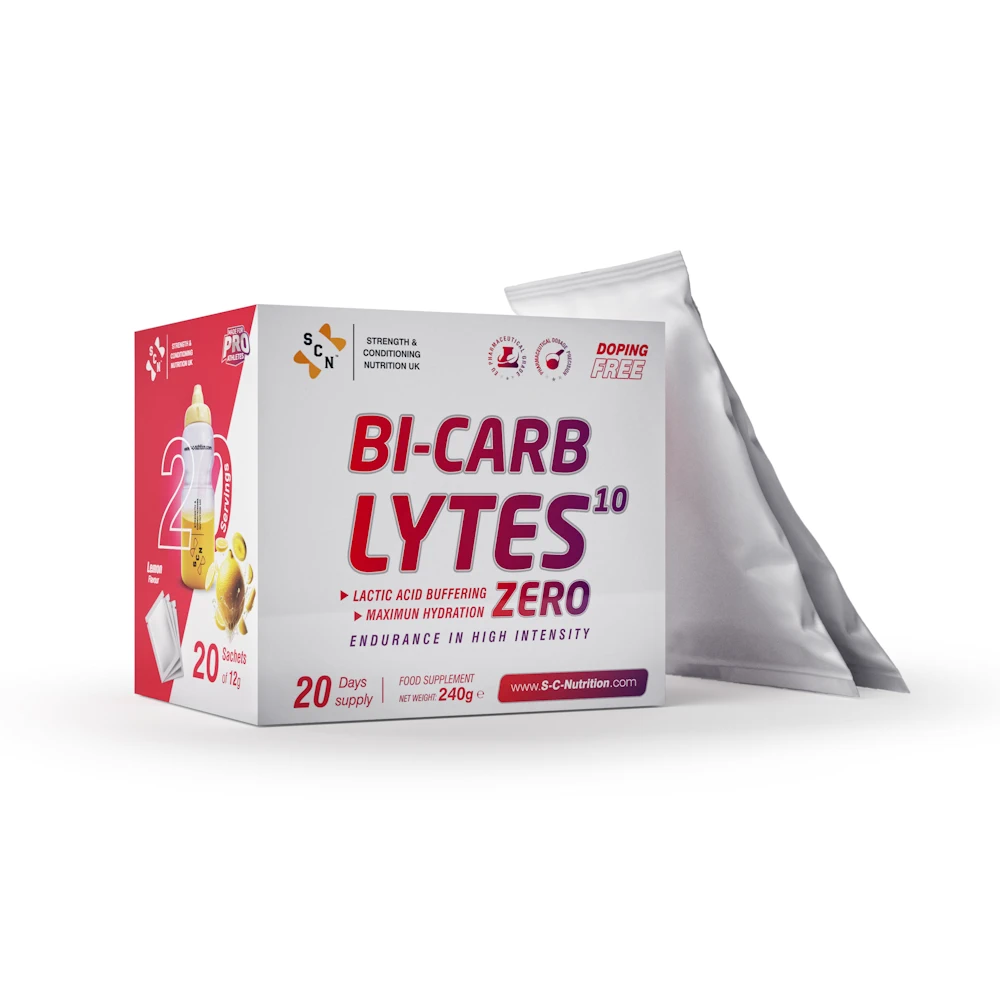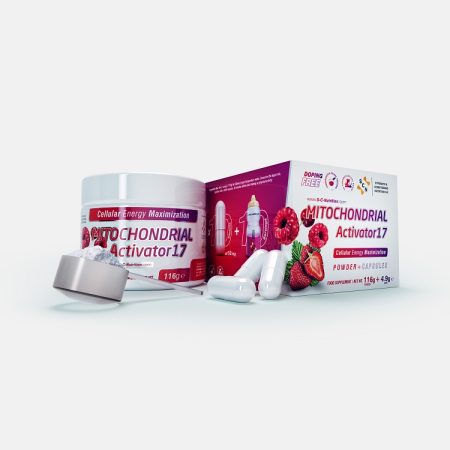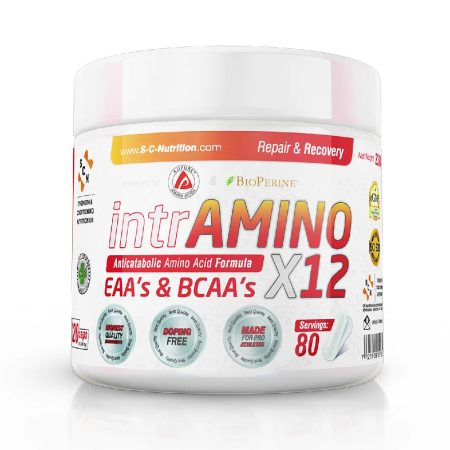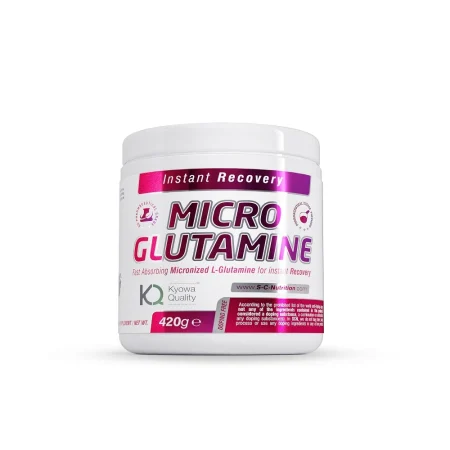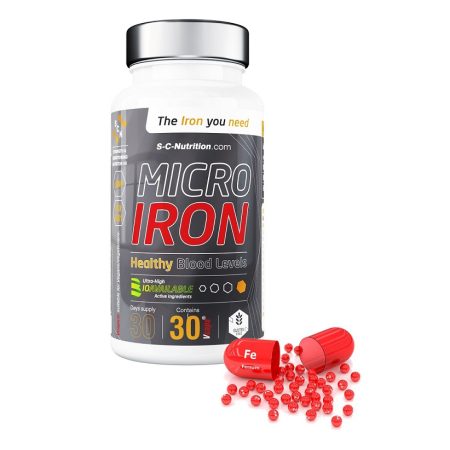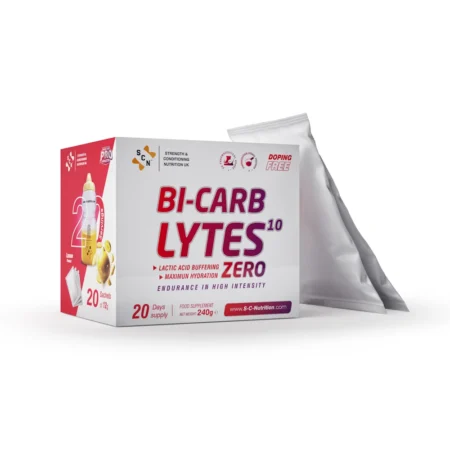Description
Bicarb-Lytes¹⁰ Zero
The Ultimate Zero-Sugar BiCarb & Salt Product
✓ Sodium BiCarbonate
✓ Endurance Phosphate Salts
✓ Over 5000mg of 10 types of salts
✓ 4 types of Sodium
✓ 3 types of Magnesium
✓ 3 types of Calcium
✓ Zero Carbs
✓ Zero Sugar
Bicarb-Lytes¹⁰ Zero, is the 4th product of our Lactate Buffering series (and not the last 😏), together with Pre-Lactate Training Activator, Race Max Pro, Carbo⁶-Lytes¹¹.
SCN™, dedicated, as a clinic since 2011 and as a supplement brand since 2015, to professional and high-level endurance sports athletes, is expanding it’s range of specialised products, to maximize the endurance performance of the athletes.
Bicarb-Lytes¹⁰ Zero – What it is:
Bicarb-Lytes¹⁰ Zero, is a product providing 3500mg of Sodium Bicarbonate together with Endurance enhancing salts.
The result of this combination, is a product that keeps the athlete hydrated, even during the most demanding training, but also improving the athlete’s endurance and performance while also helping them buffer lactic acid.
With simple words, the best salt-bicarb formula even made!
Make any product on the market a super product
Turn anything you use into a super hydration – energy increasing – lactate buffering formula
Bicarb-Lytes¹⁰ Zero, is designed to go with any product you use.
Add 1 sachet of Bicarb-Lytes¹⁰ Zero to your pre-workout, to your BCAA’s formula, to your ELectrolytes drink, to your carbohydrates drink….or any type of product you use before and during your training, and make it the ultimate super hydration – energy increasing – lactate buffering formula.
Pyruvate – Pure Energy
Pyruvate is an important chemical compound in biochemistry. It is the output of the anaerobic metabolism of glucose known as glycolysis. One molecule of glucose breaks down into two molecules of pyruvate, which are then used to provide further energy in one of two ways.
Benefits of Pyruvate:
- Provides energy via Krebs Cycle
- Contributes in Important metabolic reactions:
- Glucose ⇔ Alanine cycle
- pyruvate ⇒ AcetylCoA
- Pyruvate ⇒ Oxaloacetate
- Pyruvate ⇔ Lactate
- Improves Athletic Endurance
- Spares Glycogen Storages
Calcium Pyruvate
Energy & Endurance
Calcium pyruvate is a natural substance made in our bodies that contributes to metabolism and the digestion of carbohydrates.
Calcium pyruvate is the compound that starts the Kreb’s Cycle, by which our bodies make adenosine triphophate (ATP) or energy during aerobic respiration.
Aerobic respiration is that which occurs in the presence of oxygen, during exercises, such as running and jogging.
Calcium pyruvate supplementation improves endurance athletes whose bodies are constantly turning over ATP production for sufficient energy to perform sustained bouts of exercise.
Transporting glucose and protein to muscle cells and making optimal levels of ATP available are the theoretical benefits of calcium pyruvate.
The best part is that it increases energy while reduces fatigue from endurance athletes.
Sodium Phosphate
Sodium phosphate works by increasing aerobic capacity and delays exhaustion.
Sodium phosphate is a type of supplement designed to increase endurance. It has been shown to improve lung capacity which results in better breathing rates during exercise and more oxygen intake.
THE BENEFITS FOR ENDURANCE ATHLETES
Sodium Phosphate can help athletes in multiple ways:
- It can make them better at key activities such as racing, intervals, and sprinting.
- Sodium phosphate can also help muscle acidity during intense exercise.
- It may help with cramping and muscle pain during racing and workouts.
- It increases aerobic capacity by increasing the oxygen available to muscles during exercise.
- Sodium phosphate increases time to exhaustion for endurance exercises like cycling or running.
- Sodium phosphates reduce muscle tissue breakdown which would be important if you’re an athlete who does not get enough rest between workouts.
SODIUM PHOSPHATE + SODIUM BICARBONATE
Sodium phosphate is different from sodium bicarbonate because it has the same ionic charge as phosphoric acid, and works in a similar way to increase aerobic capacity.
Combining Sodium Phosphate with Sodium Bicarbonate, you have an poweful combination of ingredients working together to maximize your endurance and sport performance.
What is inside Bicarb-Lytes¹⁰ Zero?
Nutrients per recommended daily dose:
| Ingredient | Per 1 sachet (12g) | %NRV* |
| Sodium bicarbonate
Sodium |
3500 mg
945 mg |
|
| Sodium triPhosphate
Sodium |
1500 mg
450 mg |
|
| Sodium chloride
Sodium |
1200 mg
468 mg |
|
| Potassium citrate
Potassium |
1100 mg
396 mg |
20% |
| Sodium citrate
Sodium |
500 mg
117,75 mg |
|
| Calcium pyruvate
Calcium |
500 mg
77,5 mg |
9,7% |
| Calcium bisglycinate
Calcium |
500 mg
100 mg |
12,5% |
| Calcium glycerophosphate
Calcium |
500 mg
95 mg |
11,9% |
| Total calcium | 272,5 mg | 34% |
| Magnesium gluconate
Magnesium |
300 mg
16 mg |
4,2% |
| Magnesium citrate
Magnesium |
300 mg
45 mg |
12% |
| Magnesium bisglycinate
Magnesium |
300 mg
60 mg |
16% |
| Total magnesium | 121 mg | 32% |
*NRV Nutrient Reference Value
Sodium Bicarbonated – More oxygen into your cells
- Sodium bicarbonate has the chemical formula NaHCO3. It’s a mildly alkaline salt made up of sodium and bicarbonate ions.
- Sodium bicarbonate clears acid out of muscle cells, helping restore an optimal pH. This may decrease fatigue and increase performance.
- Sodium bicarbonate may help improve performance in the later stages of high-intensity exercise.
- Sodium bicarbonate likely improves the body’s ability to perform during interval training, which may benefit performance in many sports.
- Sodium bicarbonate may improve muscle coordination and increase strength. It could also increase the number of heavy-weight repetitions you can do at the gym
To understand how sodium bicarbonate works, it is helpful to first understand the concept of pH.
How pH Affects Exercise Performance
In chemistry, pH is a scale used to grade how acidic or alkaline (basic) a solution is.
A pH of 7.0 is considered neutral. Anything lower than 7.0 is acidic and anything above that is alkaline.
As humans, our pH is naturally close to neutral. It normally stays around 7.4 in blood and 7.0 in muscle cells.
You function best when your acid-alkaline balance remains close to this target, which is why your body has various ways to maintain these levels.
However, certain diseases or external factors can disrupt this balance. One of these factors is high-intensity exercise, also known as anaerobic exercise.
During anaerobic exercise, your body’s demand for oxygen exceeds the available supply. As a result, your muscles cannot rely on oxygen to produce energy.
Instead, they must switch to a different pathway — the anaerobic pathway.
Creating energy through the anaerobic pathway produces lactic acid. Too much lactic acid decreases your muscle cells’ pH below the optimal 7.0.
This disrupted balance limits energy production and may also reduce your muscles’ ability to contract. Both of these effects ultimately lead to fatigue, which reduces exercise performance.
How Sodium Bicarbonate Helps Maintain pH
Sodium bicarbonate has an alkaline pH of 8.4 and can therefore raise your blood pH slightly.
Higher blood pH allows acid to move from muscle cells into the bloodstream, returning their pH to 7.0. This enables the muscles to continue contracting and producing energy.
Scientists believe this is the primary way that sodium bicarbonate can help you exercise harder, faster or for longer.
Sodium bicarbonate is especially helpful for high-intensity exercise that lasts between 1 and 7 minutes and involves large muscle groups.
Additionally, most improvements seem to take place near the end of a workout. For example, a recent study observed a 1.5-second performance improvement in the last 1,000 meters of a 2,000-meter (1.24-mile) rowing event.
The results are similar for cycling, sprinting, swimming and team sports.
However, the benefits can vary from person to person. They may also depend on the type of activity, gender, personal tolerance and training level.
Interval training is when a person alternates between intense and less-intense exercise during a single session.
Some examples of this type of training include forms of running, cycling, rowing, swimming, Olympic weightlifting and CrossFit.
Studies that looked at this type of exercise found that sodium bicarbonate helped prevent decreases in performance.
This generally led to overall improvements of 1.7–8%.
Interval training is very common in many sports, and studies find that sodium bicarbonate intake can benefit judo, swimming, boxing and tennis.
Finally, the ability of sodium bicarbonate to help you push through the final stages of your workout may also improve your workout results.
For example, participants who took sodium bicarbonate during an 8-week interval-training program had cycled for 133% longer by the end of the study period.
Sodium bicarbonate may also help increase strength.
In one study, experienced weightlifters who took sodium bicarbonate 60 minutes before a workout were able to do 6 more squats in their first of three sets.
This suggests that sodium bicarbonate can enhance performance, especially at the beginning of a session.
In addition, sodium bicarbonate may also benefit muscle coordination.
For example, one study found that it helped maintain tennis players’ swing accuracy. Another study found similar benefits for boxers’ punch accuracy.
These outcomes suggest that sodium bicarbonate could have effects on the brain.
Ingredients: Sodium bicarbonate, Sodium triphosphate, Sodium chloride, Potassium citrate, Flavour, Sodium citrate, Calcium pyruvate, Calcium bisglycinate, Calcium glycerophosphate, Anti-caking agent (magnesium salts of fatty acids), Magnesium gluconate, Magnesium citrate, Magnesium bisglycinate, Anti-caking agent (silicon dioxide), Sweeteners (sucralose, steviol glycosides from Stevia).
Product Information:
- Serving: 1 sachet of 12g
- Servings per container: 20
- Net Weight: 260g
- Flavour: Lemon
Suggested use: Mix 1 sachet (12g) to 250ml of room temperature water. Consume the mix before and during training
Recommended daily dose: 12 g (1 sachets)
Maximum daily dose: 24g (2 sachets)
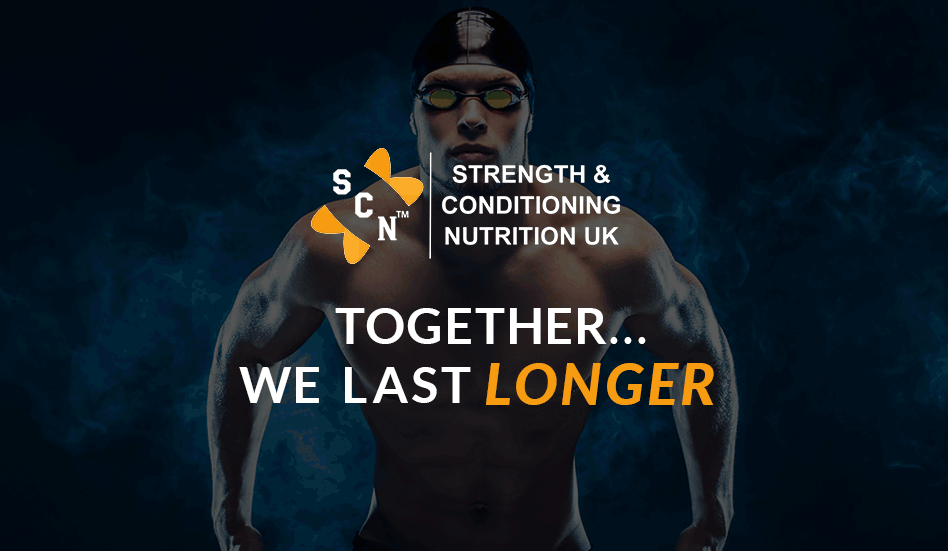
*This website is for your education and general health information only. The ideas, opinions and suggestions contained on this website are not to be used as a substitute for medical advice, diagnosis or treatment from your doctor for any health condition or problem. Users of this website should not rely on information provided on this website for their own health problems. Any questions regarding your own health should be addressed to your own physician. Please do not start or stop any medications without consulting with your doctor. We neither encourage you to do so, nor can we be held responsible for the fall out of failing to seek the counsel of a medical health practitioner.

